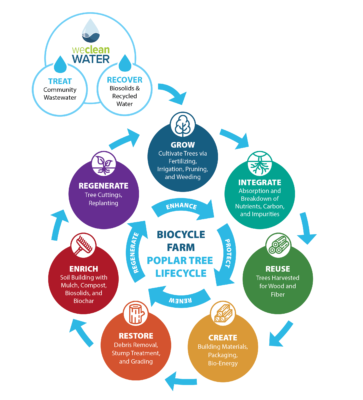Click here if you are a:
Reference Resources
MWMC Poplar Farm Presentations & Mentions:
- MWMC Hybrid Poplar as Wastewater Management Tool Presentation
- Poop & Poplars: A Match Made in Heaven?
- Use of Poplar Trees for Wastewater and Biosolid Utilization
- WSU Extension Workshop Brings Together Wastewater Treatment Facilities and the Wood Products Industry
Poplar Used for Built Materials:
- Poplar Plantations Video
- Garnica Poplar Pywood Video
- 9 Wood Grilles in Wood Ceilings – The Most Common Questions Video
- 9Wood EcoGrille and FSC Pacific Albus Video
Biofuels/Sustainability Efforts:
- Advanced Hardwood Biofuels (AHB) Northwest Infosheets
- AHB Environmental Sustainability
- AHB Everyday Products from Renewable Poplar Trees Video
- AHB Video Library
- Partnering Trees and Microbes for Tackling Environmental Pollutants
For Contractors:
2021 Biocycle Farm Poplar Harvest
The Metropolitan Wastewater Management Commission (MWMC) is preparing to harvest Management Unit 3 (MU3) on its Biocycle Farm in 2021. The Biocycle Farm is a 400-acre plantation of poplar trees on agricultural land in north Eugene.
The poplars grow rapidly by consuming nutrients in biosolids, making the Biocycle Farm a cost-effective method for recycling a byproduct of the wastewater treatment process. The trees are managed as an agricultural crop, with a growth period of up to 12 years, and then harvested and sold in the marketplace to offset operating costs for the farm, as well as provide a renewable resource for our community.
If you’re an architect, a builder, affiliated with a milling company, or anyone interested in quality wood, we want to hear from you! To learn more and to add your name to a list of potentially interested partners, email Todd Miller, City of Springfield Environmental Services Supervisor, at tmiller@springfield-or.gov.
Informational Videos
Learn more about the lifecycle of our Biocycle Farm poplar trees and the renewable process that results in a sustainable resource for our community.
Check out this video to learn more about the MWMC’s efforts to protect the health of our community and the environment in a sustainable manner.
Watch to learn more about the MWMC and how we clean wastewater for the Eugene-Springfield area.


